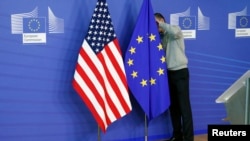Trade negotiations resume Monday on two major pacts involving the United States. In New York, talks get under way on a controversial trans-Atlantic deal that sparked street demonstrations over the weekend in Germany; in Tokyo, U.S. and Japanese negotiators resume discussions of a trans-Pacific deal after reporting progress the previous day.
The Transatlantic Trade and Investment Partnership, known as TTIP, is in its ninth round of negotiations, which are expected to last four days. They’re aimed at removing tariffs, cutting red tape and reducing restrictions on investment in a trade area covering 800 million people. The pact is said to have the potential to create 13 million trans-Atlantic jobs.
On Sunday, two days of cabinet-level discussions began in Tokyo on the Trans Pacific Partnership. Impediments include access to the U.S. car market and Japan’s farm market, Reuters news service reported. It noted the United States and Japan respectively have the world’s largest and third-largest economies.
President wants authority
U.S. President Barack Obama on Friday called for major progress this year with the 28-nation European Union, America’s top export market, now that a bipartisan measure granting him trade promotion authority, or TPA, has been introduced in the U.S. Congress.
"In this [TPA] framework, for the first time there are requirements for enforceable labor and environmental provisions,” Obama said. “There is a clear attention to issues like human rights. And, in many ways, this is the most far-reaching and progressive trade promotion authority that we’ve seen going through Congress."
The TPA would only allow Congress to vote up or down on a trade agreement but would not give lawmakers the ability to make changes.
Resistance cited
However, the measure faces stiff opposition among congressional members of Obama’s Democratic Party.
U.S. Senator Bernie Sanders, a Vermont Independent who typically caucuses with Democrats, also expressed disdain for the pact.
"Over the years, we have lost millions of decent paying jobs,” Sanders said on the U.S. television show “Fox News Sunday.” “These trade agreements have forced wages down in America, so the average American worker today is working longer hours for lower wages. I do not think we need to send more jobs to low-wage countries. I think corporate America has got to start investing in this country and create decent-paying jobs here."
Obama says opposing the trade agreement would be a ratification of the status quo, where foreign companies sell in the United States, but U.S. companies are not able to compete effectively overseas.
Protests against TTIP
TTIP is supported by German Chancellor Angela Merkel, whose country has Europe’s largest economy. But thousands took to the streets in Germany and elsewhere Saturday to oppose the trans-Atlantic trade talks. They denounced what they see as a lack of transparency, favoritism toward large corporations and undermining consumer rights.
Gary Hufbauer, senior fellow at the Washington-based Peterson Institute for International Economics, said this opposition likely will delay approval of T-TIP until after Obama leaves office in 2017.
However, he predicted Obama has sufficient support in Congress to gain trade promotion authority.
"I think the votes are there,” Hufbauer said. “… It is true that President Obama has to round up some reluctant Democrats. But, the power of the presidency is very, very great with respect to all kinds of things congressmen want and I think he will get the necessary 25 votes out of the Democrats to pass this in the House [of Representatives] and it will certainly pass in the Senate."
Trans-Pacific Partnership
Hufbauer is also upbeat about the prospect of a breakthrough in U.S.-Japan talks on the 12-nation Asian free-trade pact known as the Trans Pacific Partnership or TPP. He said he expects Prime Minister Shinzo Abe, who is to make a state visit to Washington on April 28, to make the necessary concessions in Japan’s beef, pork and dairy markets to allow for a breakthrough.
JP Morgan senior economist Masamichi Adachi in Tokyo said the discussions are about opening Japan’s agricultural and auto sectors, as well as the U.S. auto parts market.
But, Adachi said the outcome of the trade promotion authority debate in Washington is what really matters.
"If the Congress gives President Obama this authority, then the negotiations would be much easier and that’s a key event that we see in progress on this negotiation."
Obama warns of disadvantage
Obama has warned that if the U.S. does not help shape the rules so American businesses and workers can compete in these fast-growing Asian markets, China will set up rules that give Chinese workers and businesses an advantage.
Hufbauer said he expects a vote on trade promotion authority by June and ratification of the TPP by year’s end. He predicted the Asian free-trade agreement will result in greater U.S. involvement in setting the rules for the 21st century on such issues as state-owned enterprises, intellectual property, investment and tariffs.
Hufbauer called TPP a gateway agreement for other countries to join, including South Korea, Thailand, Indonesia and the Philippines. He even expects China to align itself with the agreement in five to seven years.




